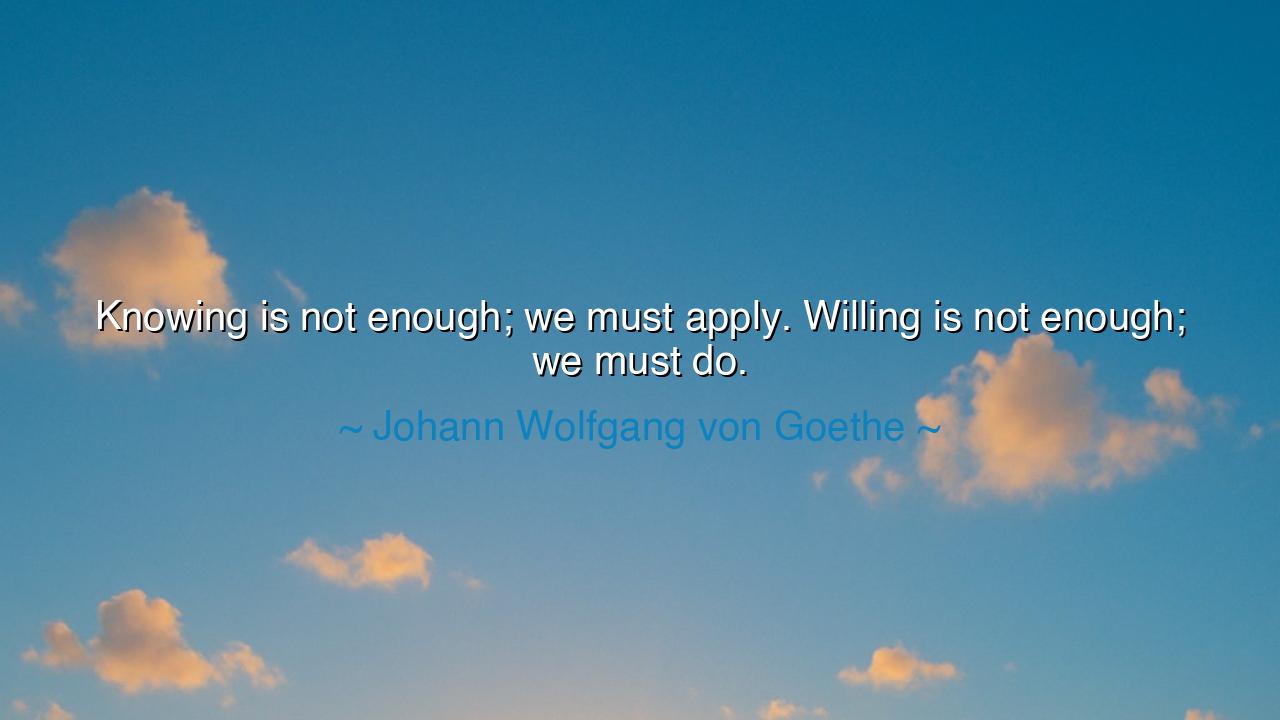
Knowing is not enough; we must apply. Willing is not enough; we






The words of Goethe—“Knowing is not enough; we must apply. Willing is not enough; we must do.”—are a call from the ages, a cry that pierces the slumber of the heart. Knowledge, though radiant like the sun, is powerless if it never descends to earth. Will, though fierce like the wind, is hollow if it never moves a single stone. Goethe, master of the spirit, reminds us that the treasures of the mind and the fire of desire must be harnessed in action, or they dissolve into shadows of what might have been.
From the beginning of time, men have gathered wisdom as one gathers seeds. Yet what are seeds if never planted in soil? They rot, they vanish, and no harvest comes. So it is with knowledge: it is not enough to know the path of virtue, the principles of health, the strategies of victory. One must set the feet upon that path, taste the discipline of labor, and bring theory into life. The wise man does not merely know justice; he acts justly. He does not merely know courage; he takes the step into danger.
Consider the tale of Leonidas at Thermopylae. Many Greeks knew the threat of Persia; many willed their homeland to be free. Yet it was Leonidas and his three hundred who applied their training, who did the impossible. Their stand carved freedom into the memory of mankind. Without action, the knowledge of Persia’s strength and the will to resist would have faded into lamentation. But action gave birth to legend, and legend still breathes life into nations.
So too in more humble times, in the lives of ordinary men and women. How many dream of learning a craft, of healing their bodies, of serving the poor? They read, they speak, they even make promises to themselves. Yet without the sacred step into application, without the courage to do, these dreams fade into dust. A library of wisdom, unacted upon, is no different from an empty room. A will without deeds is as futile as a sword left rusting in its sheath.
Goethe’s teaching is not merely philosophy; it is command. He insists that we be warriors in life, not idle scholars of ideals. For in action, the soul is tested, refined, and made strong. Only when the mind’s flame sets the heart in motion, and the heart’s motion sets the body to work, does man become complete. Action is the bridge between the unseen and the seen, between what we wish for and what becomes real.
The lesson for us, children of today, is clear. Let us not remain captives of endless planning, of thoughts untried and desires unmet. Let us choose a single truth we have learned, and apply it this very day. Let us seize one noble will, and do something small but real to honor it. If you have studied the way of kindness, go and extend your hand to one who suffers. If you have willed to grow in strength, rise and take the first step, even if it trembles.
Practical action need not be grand. Write the first words of the book that lies waiting in your heart. Offer the first coin to the beggar you pass each morning. Speak the first word of reconciliation to the friend you have wronged. Each act is a spark, and from sparks comes fire, and from fire comes the transformation of the world.
So remember Goethe’s eternal cry: Knowing is not enough; we must apply. Willing is not enough; we must do. Let these words be inscribed upon the gates of your heart. Let them awaken you when you would drift into inaction. For life is not merely to know, nor merely to will—it is to rise, to move, to build, and to leave behind deeds that echo when our voices are gone.






AAdministratorAdministrator
Welcome, honored guests. Please leave a comment, we will respond soon